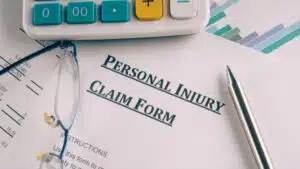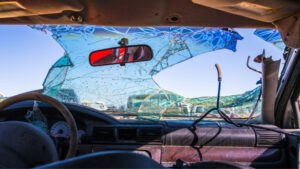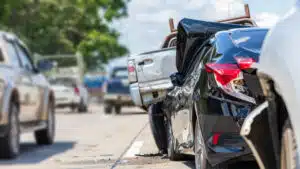
Today’s question comes from the family of a young woman who was fatally injured in San Francisco. The death was caused by a vehicle owned by the City and County of San Francisco (CCSF) which was being operated by a City employee as part of their regular official work duties.
The vehicle in this case was a government service/shuttle van and not a police, fire or ambulance vehicle. The vehicle made a left turn from a lane, and at a location, reserved only for busses and taxis (one of those red painted lanes) and struck a pedestrian lawfully crossing in the crosswalk. If the vehicle had not made a left hand turn the death would not have happened.
The officers purportedly told the family that the vehicle was permitted to violate the Vehicle Code because it had “exempt” license plates.
I was asked to research the validity of that statement.
For those not familiar with an ‘exempt” license plate, these are plates that are displayed on the back of government owned vehicles.
What this exempts them from is paying taxes and registration. It does not give them the right to violate traffic laws.
People ask “what are they exempt from?” Pursuant to California Vehicle Code Section 9101, they are exempt from registration and licensing fees.
Vehicle Code Section § 9103 states: “Fees specified in this Code, except fees for duplicate plates, certificates, or cards, are not required to be paid for any vehicle of a type subject to registration owned by the United States , state or by any municipality.” So, aside from duplicate plates and cards, the City is exempt from fees associated with registration and licensing.
The general rule is that the California statewide statutory regulations, contained in the Vehicle Code, regarding operation of a motor vehicle, aside from parking regulations, are applicable to all drivers: municipal codes do not control and cannot conflict with state regulations unless state law expressly gives the municipality that
authority.
Vehicle Code Section 21052 states: “The provisions of this code are applicable to the drivers of vehicles upon the highways while engaged in the course of employment by this State, any political subdivision thereof, any municipal corporation, or any district, including authorized emergency vehicles subject to those exemptions granted such authorized emergency vehicles in this Code.” So, aside from the limited exceptions granted emergency vehicles, and a limited class of other vehicles (referenced below), all vehicles owned by CCSF must comply with the same Vehicle Code regulations as the rest of us.
Vehicle Code Section 21053 exempts government owned vehicles and other equipment “while actually engaged in work upon the surface of a highway, or work of installation, removal, repairing, or maintaining official traffic control devices. This Code does apply to those persons and vehicles when traveling to or from their work.”
California Vehicle Code Section 21059 exempts garbage trucks. Section 21060 exempts street sweepers and they can’t be fined for violating the Code. That does not relieve the driver from operating safely it just means that they can’t get a ticket.
California Vehicle Code Section 21055 provides the following regarding emergency vehicles: “The driver of an authorized emergency vehicle is exempt:
(a) If the vehicle is being driven in response to an emergency call or while engaged in rescue operations or is being used in the immediate pursuit of an actual or suspected violator of the law or is responding to, but not returning from, a fire alarm, except that fire department vehicles are exempt whether directly responding to an emergency call or operated from one place to another as rendered desirable or necessary by reason of an emergency call and operated to the scene of the emergency or operated from one fire station to another or to some other location by reason of the emergency call.
(b) If the driver of the vehicle sounds a siren as may be reasonably necessary and the vehicle displays a lighted red lamp visible from the front as a warning to other drivers and pedestrians. A siren shall not be sounded by an authorized emergency vehicle except when required under this section.”
Therefore if they meet these requirements AND they use both lights and sirens (“Code 3”) they are immune.
However, the Code states: “Section 21055 does not relieve the driver of a vehicle from the duty to drive with due regard for the safety of all persons using the highway, nor protect him from the consequences of an arbitrary exercise of the privileges granted in that section.”
So, it seems that the police, when stating that the City owned vehicle was exempt from the traffic laws were either uninformed or lying to protect the City from liability. This is exactly why a good Trial Lawyer is needed by people when they are harmed by the fault of someone else, including their own government.
This article was written by Chris Dolan and published by The San Francisco Examiner. To read all of Chris’ articles on the law published by the Examiner click here.










